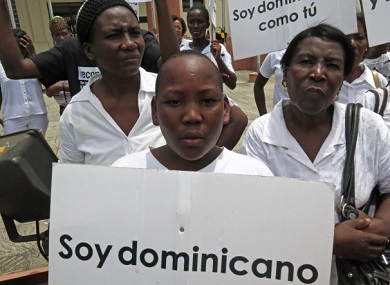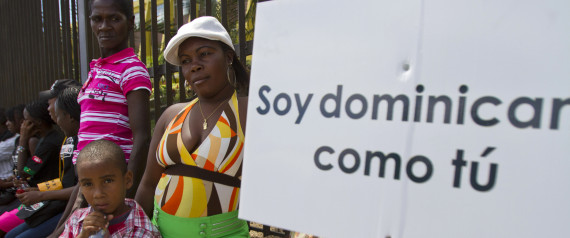 On September 26, the Dominican Republic’s top court stripped citizenship rights from thousands of people born to illegal migrants living in the country that shares the Hispañola island with Haiti.
On September 26, the Dominican Republic’s top court stripped citizenship rights from thousands of people born to illegal migrants living in the country that shares the Hispañola island with Haiti.
A U.N.-backed study released this year estimated that there are nearly 210,000 Dominican-born people of Haitian descent and roughly another 34,000 born to parents of another nationality.
The decision applies to those born after 1929 – a category that overwhelmingly includes descendants of Haitians brought in to work on farms.
"It appears to affect even their grandchildren," Wade McMullen, a New York-based attorney at the Robert F. Kennedy Center for Justice & Human Rights, told the Washington Post.
The ruling by the Constitutional Court is final and gives the electoral commission one year to produce a list of people to be excluded from citizenship.
Dominican officials claim that a path to Dominican citizenship is pending, but have offered no details about how it would work or who would be covered.
"Lack of education and miseducation is the culprit here,” said Maeva Renaud, Haitian poet and activist living in New York. "It's unfortunate for people to lose their sense of place, especially children.”
The majority of the displaced Haitian descendants don't have Haitian citizenship, have little or no ties to Haiti and likely don't speak Creole, saiid McMullen.
Meanwhile, attempting to acquire Haitian citizenship can also be complicated because one has to prove descent from a Haitian national.
Roberto Rosario, president of the electoral commission, insisted that the government is not denying anyone the right to a nationality, saying people would be able "to legalize themselves through the national legalization plan."
However, that plan has not yet been created, despite a 2004 immigration law that called for it, and it was not clear who would be covered.

"To all of a sudden be told no, you're not Dominican, it's very frustrating," said Elmo Bida Joseph, a 21-year-old student who said he was denied his ID and a copy of his birth certificate because he was born to Haitian migrants.
"All my dreams have been broken," said Bida, a baseball player who needed those documents to enroll in a baseball academy.
The Dominican Republic has a population of 9.4 million people; yet, natives continue to steadily immigrate to developed nations like the United States.
According to a 2004 report by the Migration Policy Institute, in the year 2000, the Dominican population in the United State was at 1.1 million.
"It's sad to know that the decision is final and the court is not allowing anyone to appeal," said Yannick Brackenridge-Jackson, president of Soul Movement Crew, an organization that works closely with Haitian immigrants in Miami, Florida. "What if America decides to adopt this idea when it comes to illegal aliens? That would be crazy."
New York, New Jersey and Florida contain the three largest pockets of Dominicans in the U.S.
Maureen Bodden was born in New York to two Dominican-born parents.
"This ruling is completely demoralizing of a race. If you are born in a country, you should be a natural born citizen. Going back to 1926 is completely absurd," said Bodden. "I love my Dominican heritage, but I really dislike the way we interact with and treat Haitians."
Bodden, who says she is a Dominican-American of African descent, believes that this new law is precipitated by racism, which pervades the psyche of many Dominican citizens.
"When I was in high school, I dated a Haitian boy and I fell in love with him. It was very hard to have my mom and my sisters accept him with open arms [and] some other family members were not as accepting," she said.
Bodden was recently informed that her maternal grandfather was born in the Dominican Republic yet is a child of Haitian immigrants. She has not been able to confirm this rumor.
"My grandfather himself told me that he is a descendant of Máximo Gómez, a Dominican General who fought for Cuba's Independence. However, should the [former] be true, what would happen to my grandfather?" said Bodden. "What would happen to him in his old age?"
Bianca Denis, a Haitian actress who grew up in Miami, Florida, claims that people are suffering all over the world because of "selfish policies like this."
"It took my family over a decade of paperwork before we were allowed to become Americans. Are Haitians to be rejected by everyone?" said Denis. "There is no Superman, Spiderman or Batman to save us in our time of need. We, as people, need countries to lend a helping hand to whomever is in need and save others with our love and kindness."

Haitian-American author Edwidge Danticat said it was "appalling" that the Dominican court has "chosen to commemorate the upcoming 76th anniversary of the October 1937 massacre of thousands of Haitians in the Dominican Republic by stripping Dominican-born men, women, and children of Haitian descent of their citizenship, rendering them not only stateless but unable to attend school or make a living while becoming even more vulnerable to all kinds of hostilities including, increasingly, physical violence."
Renaud is hopeful that "one day the entire island can find common ground when it comes to identity and teach future generations the truth about Hispañola's history."
Until 2010, the Dominican Republic automatically bestowed citizenship to anyone born on its soil. But that year, the government approved a new constitution stating that citizenship will be granted only to those born on its soil to at least one parent of Dominican blood or whose foreign parents are legal residents.

